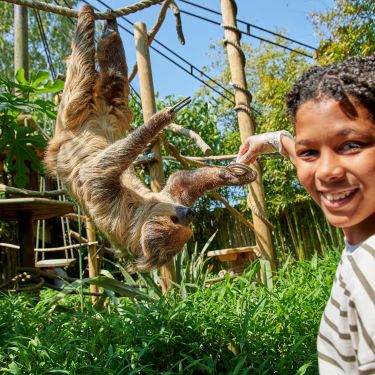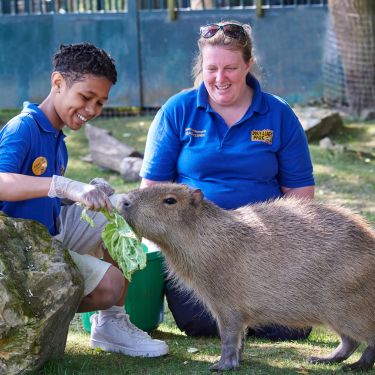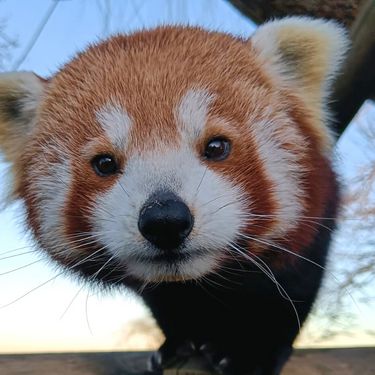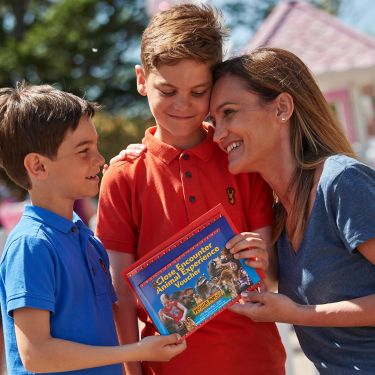



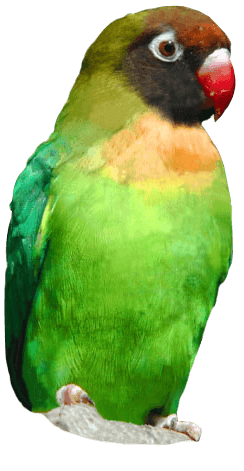
Field Conservation
Drusillas Field Conservation in Action
Our field conseravtion initiative aims to deliver meaningful, evidence-based, conservation research to inform conservation action and animal welfare.
We provide an annual grant programme available for staff to apply for conservation and research trips abroad. In 2023 our team travelled to Costa Rica to work with
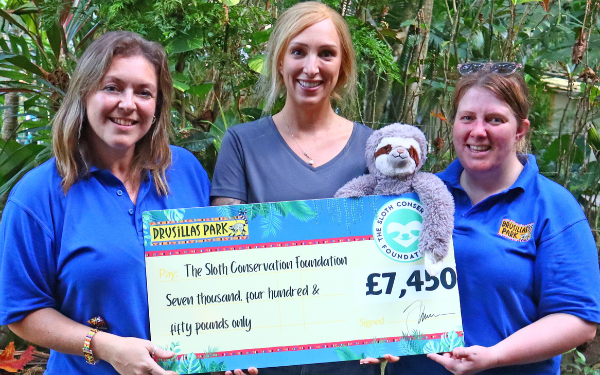
At the end of 2023, Headkeeper Gemma Romanis and Marketing Manager Tamara Nasser were tasked with travelling 5,000 miles to the province of Puerto Viejo in Costa Rica - to spend 10 days in the jungle alongside their key conservation partner The Sloth Conservation Foundation (SloCo), and immerse themselves in the world of wild sloths and how best to ensure their future survival.
The trip was a huge success, cementing the relationship between Drusillas and SloCo and deepening our understanding of the plight of sloths in the wild. Gemma and Tamara were able to observe wild sloths for the first time in both urban and rural locations, helped build sloth bridges, planted sloth-friendly trees, and even assisted in the GPS collaring of a wild sloth to add to SloCo's research project.
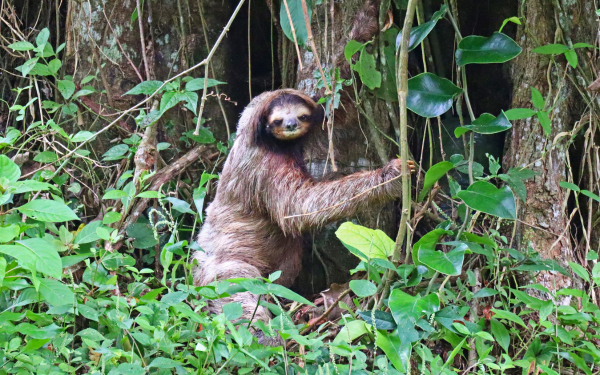
The pair were prepared for hard work, but they weren't quite prepared to witness first hand the shocking reality of the danger sloths are facing every day. During their short time in the South Caribbean they witnessed numerous sloths climbing on uninsulated power lines, one of which was severly injured and required emergency rescue - a devastating reminder of how much work is still to be done.
SloCo was founded in 2017 by sloth researcher Dr. Rebecca Cliffe. SloCo envisions a resilient and secure future where sloth populations thrive and are sustained by healthy and connected forests. After years working remotely with SloCo, and raising 10s of thousands of pounds, Drusillas wanted to further increase their support by way of conservation outreach - an opportunity to see the threats facing sloths in the wild first-hand, to contribute to field research, and gain insight into how we can better support SloCo here in the UK.
Gemma commented: "Anyone who knows me, knows that my love for sloths is borderline obsessive! I have worked with sloths for over a decade at Drusillas, and even had the privilege of hand-rearing our two-toed sloth Flash when her mother sadly passed away. The opportunity to travel to Costa Rica to play a part in the conservation of my favourite animal was a dream come true - Dr Cliffe has been a hero of mine for years and the work she has spearheaded has been an inspiration to me."
Armed with a giant cheque and a large supply of insect repellant, Gemma and Tamara arrived in Puerto Veijo on 3rd December 2023 and wasted no time rolling up their sleeves and diving into SloCo's world.
Sloth Crossings
The first project Gemma and Tamara worked on was the Sloth Crossings project with the Connected Gardens Team, Mariano, Dayber, and Juan. The team arrived at a newly built private property in Puerto Viejo where the owner had reached out to SloCo after witnessing sloths in her garden crawling across the ground towards the road. Some trees on the property had been removed during construction leaving no safe pathway in the canopy for the sloths and other wildlife, forcing them to travel down to the ground. Worried for their safety, she learned of the Sloth Crossing initiative and asked SloCo for help.
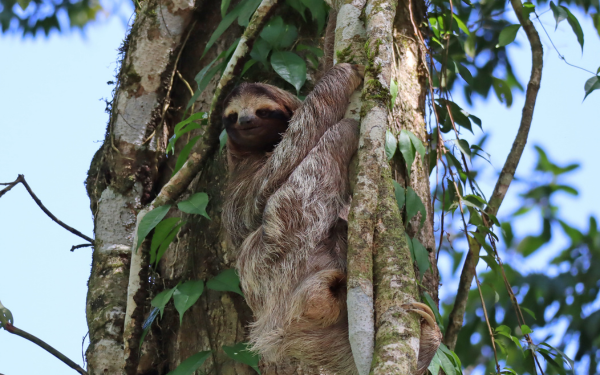
The SloCo and Drusillas team were warmly welcomed by homemade lemonade and the sighting of three sloths exploring the trees, including an infant. It was immediately evident that the site was a popular location for sloths and safe crossings were vital - the road outside the property dangerously accessible to sloths that choose to travel across the ground. The team set to work installing two new rope bridges between the disconnected canopies, physically demanding work in blistering heat.
The installation began with a survey of the trees to decide which parts have become disconnected and would benefit the most from the bridges. The SloCo team have developed a technique for installing these bridges in huge trees involving sling shots and climbing! A few hours later, two new rope bridges with trap cameras to gain insight into the wildlife that utilise them had been installed.
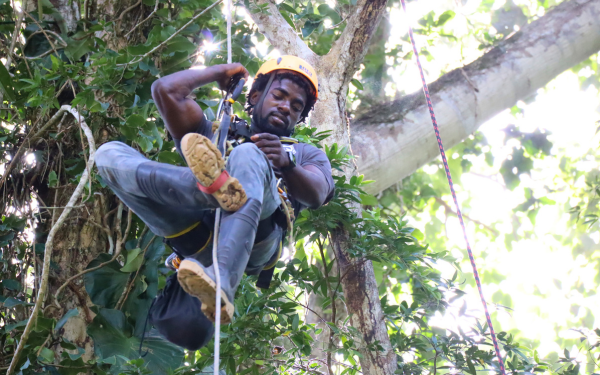
Tamara commented "It was really impressive to see the techniques used to install the bridge - you'd think that using a slingshot to feed the rope in between the correct branches would be hit or miss, but they had perfect aim every time!"
"Seeing the sloths hanging out in the tress watching us made it all the more clear why reconnecting the forest is so important. This is just one small private garden and there were three sloths unable to travel safely. Transfer those numbers to the large wild areas of the forest and you start to understand how big of a problem sloths are facing. Even the smallest disconnect in the trees creates a huge problem for a huge number of sloths."
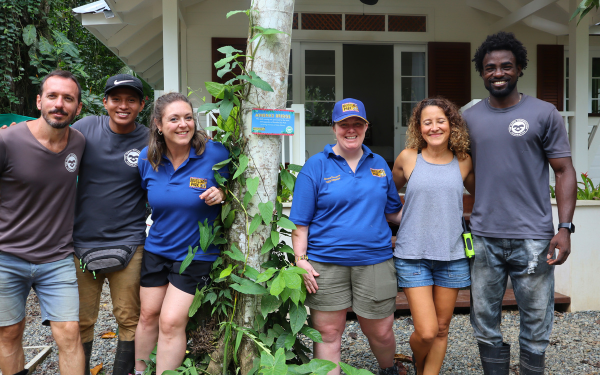
In 2022, Drusillas raised money to sponsor sloth crossings in memory of their baby sloth, Athena, who sadly passed away at 6 months old. As a sweet tribute to Athena, Gemma and Tamara, and the SloCo team hung a specially made plaque dedicating the bridge they had helped build to her memory. A few weeks after the installation of 'Athena's Bridge' the property owner sent Drusillas a photo update - a beautiful three-fingered sloth using the very same tree for his weekly toilet trip.
Gemma said "It was quite an emotional moment for me to hang Athena's plaque - but I can't think of a more perfect way to have spent the money we raised in her memory than saving wild sloths. The photo we were sent made me emotional all over again because I know that sloths only climb down trees to toilet in a place they feel is safe, so Athena's Bridge will forever be a place where sloths feel safe and that's really special."
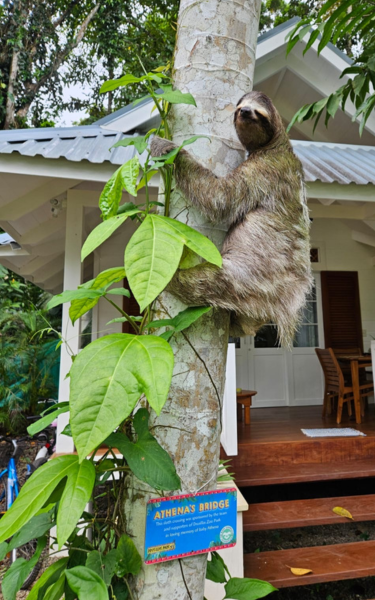
SloCo support the local community in reconnecting their own gardens, and have installed hundreds of sloth crossings since 2019, but the number of crossings needed to reconnect all the trees is endless.
Donating to Drusillas SloCo fund here is a great way you can help sponsor your own sloth crossing!
Connected Gardens
In addition to building sloth bridges, Gemma and Tamara spent a day planting trees for SloCo's Connected Gardens Project - another initiative that addresses the issues of habitat fragmentation and degradation.
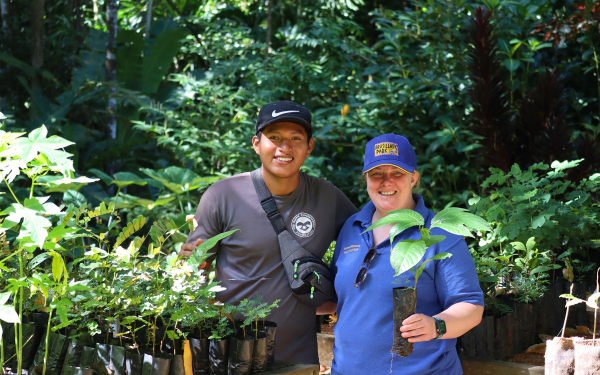
The SloCo team took the pair on a tour of the charity's plant nursery, where various species are grown from seeds and seedlings and nurtured to provide a supply of wildlife-specific trees and plants. Forest Nursery Manager, Juan, carefully cultivates an ongoing chain of plants to provide the greenery for each area in need.
After selecting the plants for the day, the team arrived at another private property where the SloCo team explained that an area on this land that was once cleared for farming is now unused, so the charity is working with the owner to rewild it with sloth-friendly trees to restore natural corridors and essential resources for wildlife. The property owners where tree planting takes place are also taught how to care for the trees and how to monitor their usage by different species.
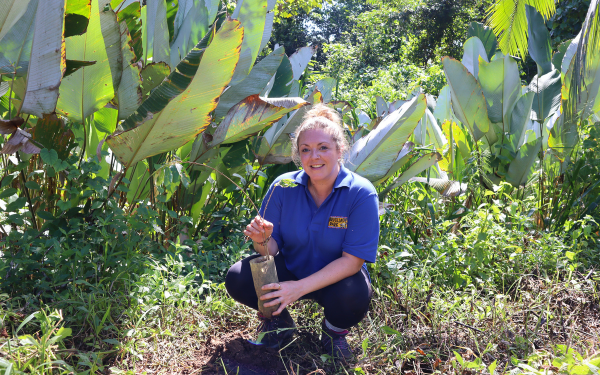
Dr Cliffe says: "We have learned that the majority of people would like to make their land as wildlife-friendly as possible; they just lack the knowledge, resources or motivation to do so. Through the Connected Gardens Project, we provide people in Costa Rica with everything that they need to make this happen – for free!"
Although tree planting is a simple enough process, the Drusillas team discovered again the demanding work that goes into each small act of reforestation. "This was definitely the hardest physical work we did whilst in Costa Rica! Digging in what felt like 40 degree heat and humidity was not easy, and we have huge respect for the guys doing this every single day. Unlike building the sloth crossings, which gave an instant result, there is a real patience and dedication to tree planting because it will be many years before the desired outcome is reached."
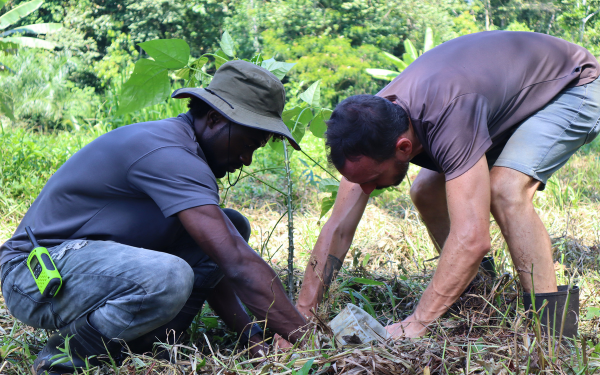
"The passion this very small team has for sloth conservation is unmatched. What was really interesting was seeing Juan collect seeds at every opportunity, to take back to his nursery and grow more plants - every piece of fruit we had became a collection of future plants for the sloths, it's sustainability in its purest form."
Sponsor a sloth-friendly tree being planted for as little as $10 here
Power Line Insulation
Although Gemma and Tamara were actuely aware of the threats sloths face in the wild, they didn't expect to witness them firsthand. But when locals started running for help near to where they were, they were heartbroken to find a sloth that had been electrocuted by poorly insulated powerlines.
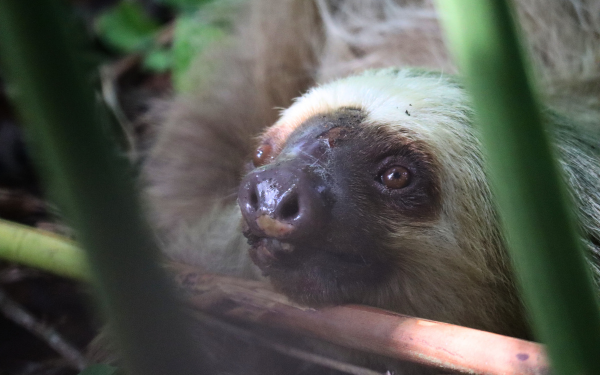
A Hoffman’s two-fingered sloth had mistaken live power lines for tree canopy and suffered horrific electrocution, instantly scorching parts of its fur, leaving exposed flesh wounds on its arms, legs, and face.
The team witnessed the visibly distressed animal moments after the electrocution, scrambling around on the ground of the private property into which it had fallen. Instinctively wanting to run and hide from the growing crowd of onlookers, the injured sloth repeatedly tried to climb up nearby trees, only to keep falling and slumping to the floor in exhaustion and pain.
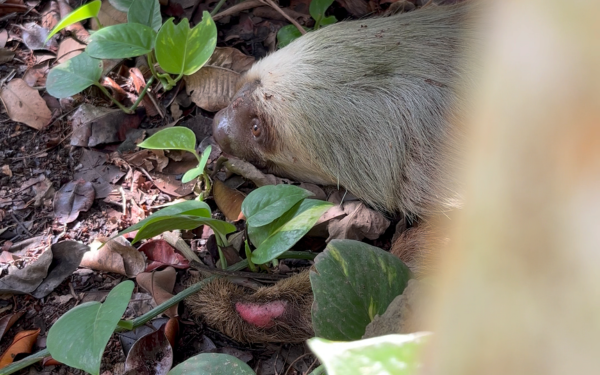
On speaking to the owner of the property, the team learned that just a few weeks ago another sloth died on the same part of the power lines, so this is not the first time this has happened, and it won’t be the last.
This sloth is just one of 3,000 animals electrocuted every year in Costa Rica, and the country is thought to have lost approximately 50% of its arboreal mammal populations as a result. Virtually all power lines in Costa Rica are poorly insulated and animals living in trees can simply climb down onto the lines from the overhanging canopy.
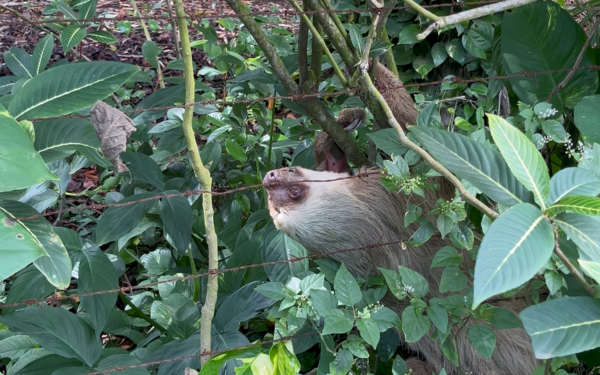
Gemma talked of the harrowing experience: “We travelled here to immerse ourselves in the work that SloCo are doing so we can better support them, but I’m absolutely speechless at what I saw today, I really did not expect to see this firsthand. What urbanisation is doing to sloths in the wild is truly horrific and heartbreaking.”
“But today also shows the importance of the work that SloCo are doing. This horrible incident is sadly the norm of what sloths are facing every day just to simply move from tree to tree and we need to work together to change it.”
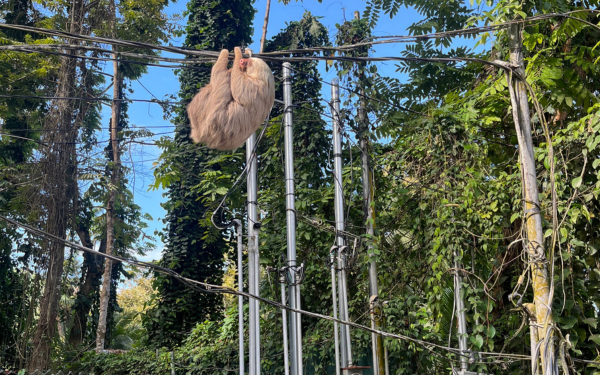
Through their Power Line Insulation Project SloCo is campaigning to fund the raw materials needed to insulate electricity lines, poles and transformers in collaboration with the Costa Rican Electricity Institute (ICE) and stop electrocutions from happening.
Learn how you can help save sloths from electrocution here
The Urban Sloth Project
The majority of our team's time in Costa Rica was spent trekking through the jungle tracking wild sloths for the Urban Sloth Project, with Biologist and Researcher Jose. During their time, Gemma and Tamara were also lucky enough to assist in the collaring of a wild sloth, since named Jemima.
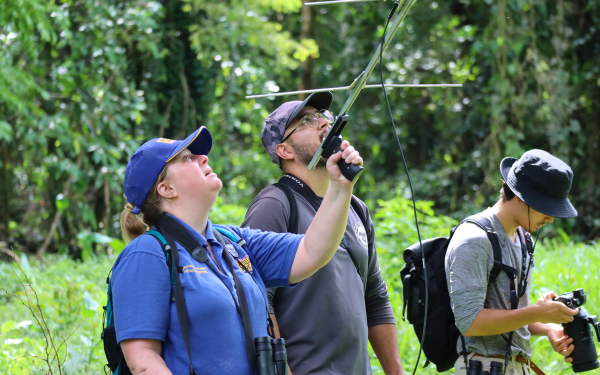
The Urban Sloth Project is a long-term investigation into the impacts of habitat disturbance and rainforest urbanisation on the behavior of wild sloths in Costa Rica. Many people believe that Costa Rica is the best place in the world for seeing sloths – and for good reason; you are almost guaranteed to see a sloth if you visit this tiny Central American country. Unfortunately, this is a sign of a much bigger problem.
Jose's passion for sloths was evident from the moment the team were introduced, and the days spent by his side as he meticulously collected data on the sloths in the project were enormously informative.
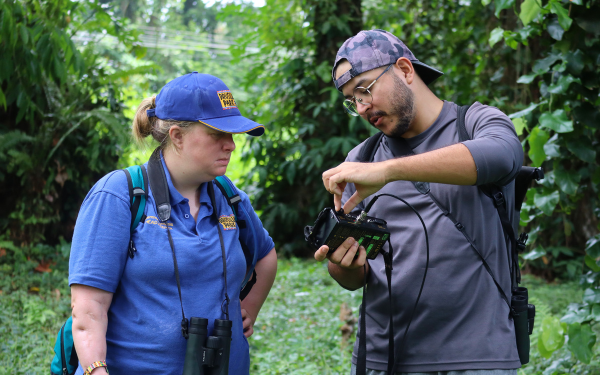
Gemma spoke about her experience tracking: "I had of course read all about sloth tracking and the project, but I didn't appreciate how difficult and time-consuming it really is. Each and every sloth in the project has to be found every single day, and all the various measurements have to be recorded to have the most accurate data possible for the research to hold weight."
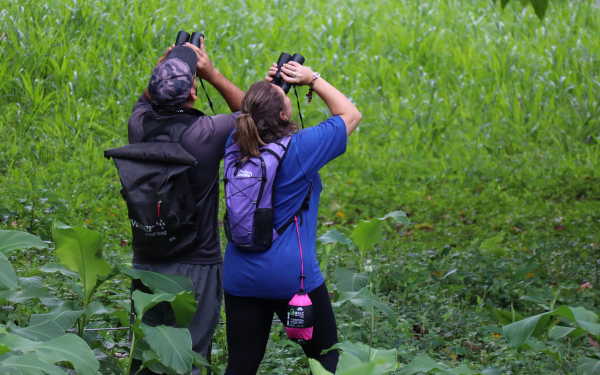
"The sloths in the project are those that have been fitted with the GPS or VHC collars - these collars send out loation signals to Jose and his team so they can find where they are on each day. But, it's not as simple as that. The antenna can give you a pretty good indication of which tree, and even which side of the tree the sloth is in, but that doesn't mean you can see it! Sloths have evolved to be elusive, and so even if you know a sloth is in a tree, it's sometimes impossible to see with the human eye."
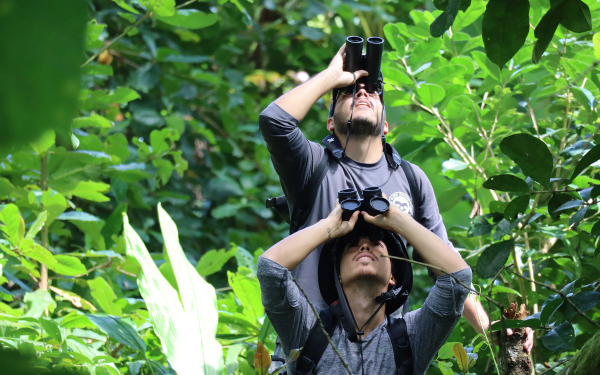
"There were five of us tracking on most days, and even with five people, each with binoculars, we still couldn't always get eyes on the sloth we knew was there! Jose's dedication is second-to-none, he told us he always searches for a minimum of one hour, ususally more, before he'll accept defeat on finding that sloth for the day. With many sloths in the project, that can be a very long day indeed."
Drusillas learnt that without physcially seeing the sloth, SloCo can't accurately record the data they need; the height at which it is sitting, circumference and species of tree, noise pollution, traffic, people, other wildlife, distance from buildings and roads - to compare this to the sloth's beahviour and movements on every other day. Without finding consistent and comparable patterns of behaviour through accurate data records, it would be impossible for SloCo to find any real insight into the effects that urbanisation is having on sloth beahviour, and consequently sloth populations.
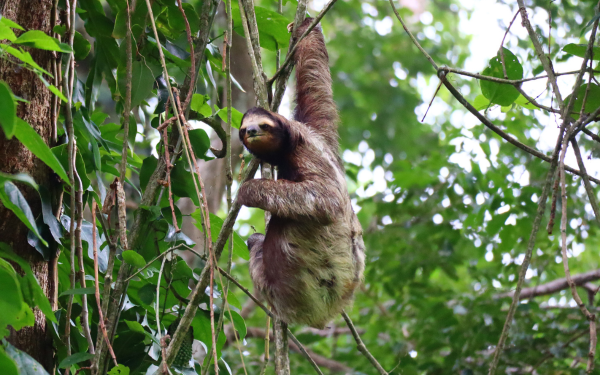
Unexpectedly, Gemma and Tamara were also lucky enough to assist with a new sloth being added to the Urban Sloth Project - a sloth they later named Jemima. Tamara spotted a three-fingered sloth whilst in an area known as 'Sloth City' and Jose immediately recognised that this sloth was on its way down to the ground for a toilet trip. This meant that the sloth would climb low enough for Jose to be able to safely catch it and fit a new GPS collar.
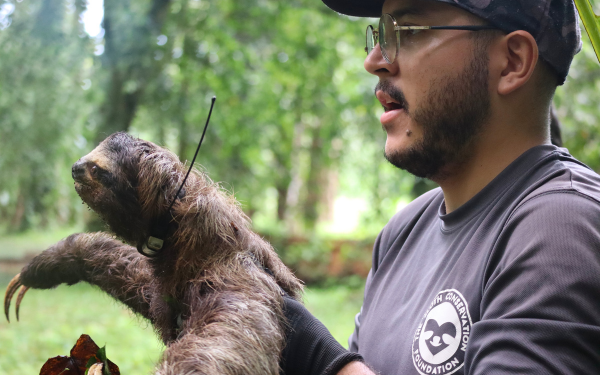
Sloths being, well, sloths, the journey down to the ground was a very slow one, leaving Jose with time to prepare the equipment needed for sloth collaring; collar, data logger, tape measure, weighing scales, and sample pots among his array of kit. The opportunity to catch up with a wild sloth doesn't present itself every day, so SloCo ensure they get as many measurements and samples as they can to feed into their research.
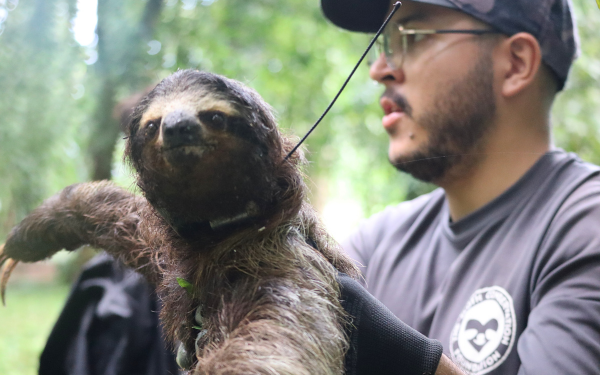
Gemma continued: "I was really hopeful that I would be able to part of collaring a wild sloth, but didn't actually believe we would be that lucky! Jose told us they hadn't seen a sloth come down in over 3 months so this was a real once-in-a-lifetime experience. The team are very experienced in what they do, with a seamless routine that minimises any distress or discomfort for the animal. The collar is fitted very quickly and gently, and the measurements can be taken very easily at the same time. Jemima was a three-fingered female, and the species is known to be less aggressive than the Hoffman's two-fingered, so the process was calm and quick and over in a few minutes."
Learn more about the Urban Sloth Project here
The Great Sloth Census
Not many people know, but pups and poop are making history in Costa Rica with the first-ever sloth population census - employing the skills of the world's first sloth detection dog, Keysha!
Gemma and Tamara spent an afternoon meeting Keysha, with owner and General Director of SloCo, Tamara, and SloCo's founder, Dr Rebecca Cliffe. SloCo's innovative initiative, using scat detection dogs to hunt for sloth poop, is one of the driving forces behind embarking on their biggest project to date - the Great Sloth Census.
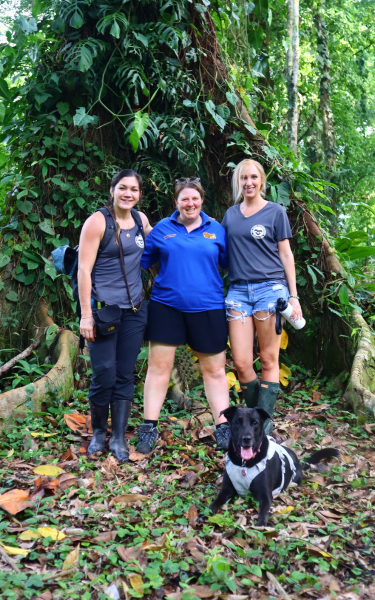
Dr Cliffe spoke about the project: "the main goal of Keysha and the scat dog project is that no one knows how many sloths there actually are, whether the populations are increasing or decreasing, becasue you can't see them. The aim with Keysha is for her to be able to tell us how many sloths there are in a particualr area by showing us how much poop there is. Our ultimate goal is to change the conservation status of sloths to something far more accurate."
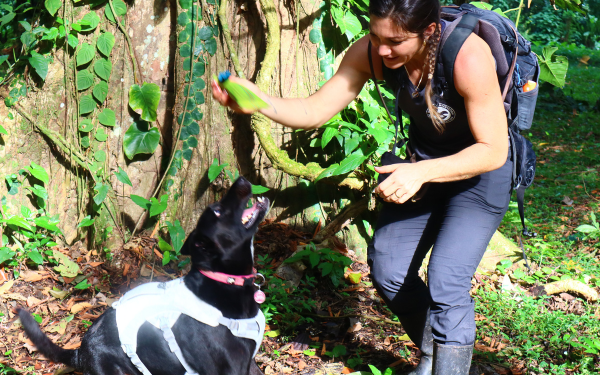
Keysha demonstrated her finely tuned skills, showing that time and again she was able to detect sloth poop and communicate to the team where it was, earning her favourite green squeaky toy as a reward. The training took months and months, and was incredibly expensive to fund - but hopefully the investment can result in a crucial shift in the conservation status of sloths.
The species of sloths under SloCo's watch are currently classified as “least concern”, according to the IUCN Red List, which means that a species population is healthy and does not require any intervention on the part of humanity to ensure its continuation. However, wildlife rescue centers in Costa Rica receive two or three sloths per day and authorities such as the Ministry of Environment and the National System of Protected Areas (SINAC) have declared that both sloth species (B. Variegatus and C. hoffmanni) living in the country are threatened and their populations declining.
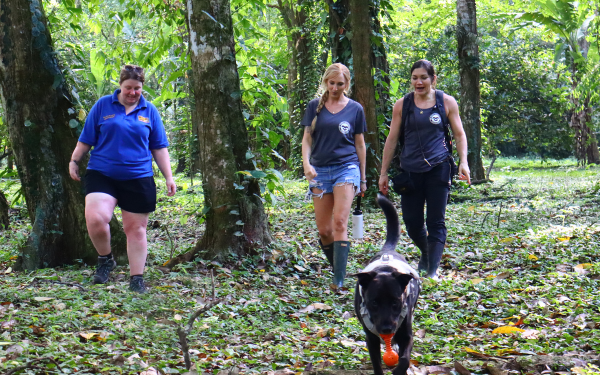
Dr Cliffe continues: "Currently, there is no accurate data available on the status of sloth populations. We don’t know how many sloths there are, how many can or should inhabit any given area, or how fast populations are declining. There is not a single population estimate available for the majority of the sloth species, population trends are not being monitored and the geographical distributions of the different species are still unknown. If we don’t know how many sloths there are (or how many there should be), or even where they live, how can we make an accurate assessment of the state of the populations?"
Learn more about the Great Sloth Census here
Future Support of SloCo
The conservation trip provided the Drusillas team with invaluable insight into the work that SloCo are doing, and Gemma and Tamara returned home with a real understanding of the huge amount of work one tiny team is doing to save sloths.
Gemma concluded: "I didn't think it would be possible to feel more passionate about sloths than I did, but being in the middle of the jungle surrounded by sloths who need our help was a truly profound experience. It's certainly going to drive me to work harder to support SloCo and I know that will feed down to the rest of our team for many years to come!
Drusillas is committed to their support of global conservation efforts, and hopes to continue to work both locally and overseas towards the goal of species preservation.
EXPLORE MORE
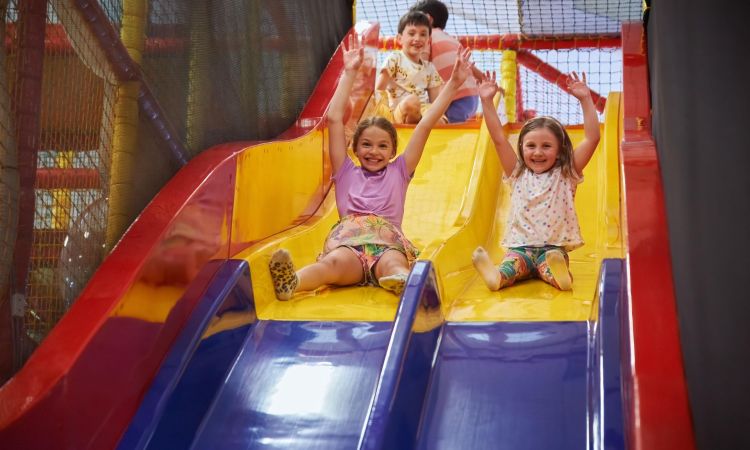
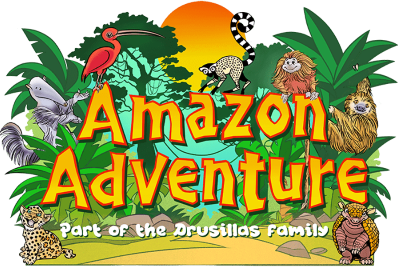
Have you visited our NEW soft play in Tunbridge Wells?
A new WILD play experience, part of the Drusillas family
Sign up to our mailing list to receive all the latest vouchers and exclusive offers!
All emails include an unsubscribe link. You may opt-out at any time. See our privacy policy here.





